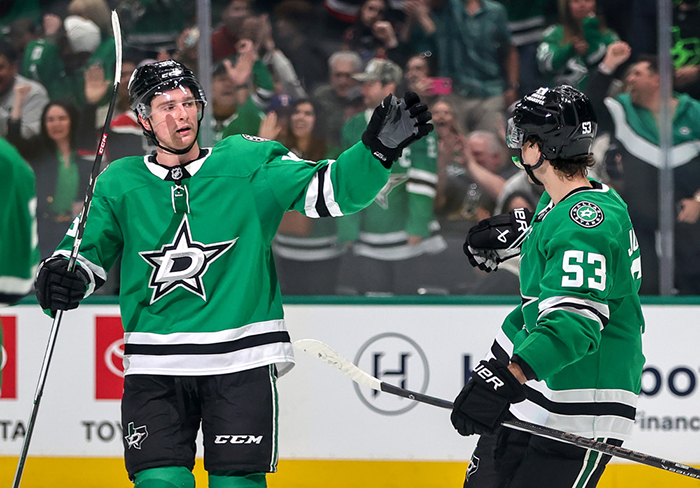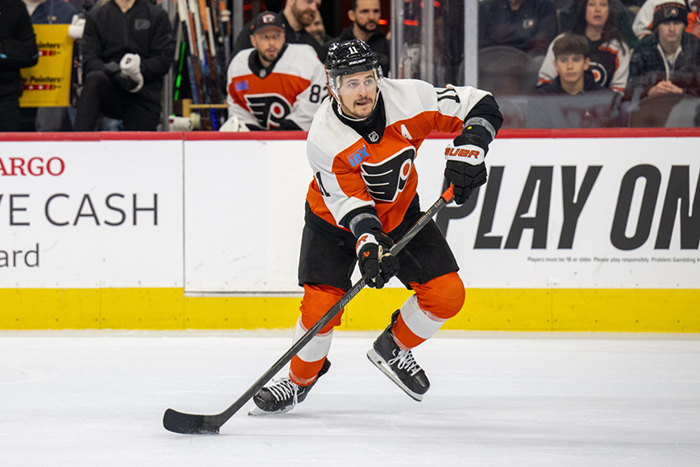In the end, it wasn’t quite enough. The Calgary Flames played meaningful hockey games for 81 of the 82 calendar dates on their 2024-25 season schedule.They went 10-2-3 over the 15 games leading up to their home finale on April 15.
The Flames also won the season’s final game in Los Angeles, but it was a pyrrhic victory at that point. Officially, the Flames lost out on the playoffs via tiebeaker with the St. Louis Blues.
The penalty kill, which had struggled most of the season, gelled during the stretch drive (47-for-53, 88.7 percent success rate to top the entire NHL over the six-week period, three shorthanded goals scored).
Rookie goaltender Dustin Wolf, who seems destined to finish fourth in the Calder Trophy race,consistently gave his team a chance to win. With top-line veteran center Nazem Kadri second, Wolf was the clear cut MVP for Calgary this year. He was a workhorse down the stretch. It should also be noted that backup Dan Vladar stepped up when called upon in the latter half of the season. But it was Wolf — below average-size for a current-day NHL goalie, and a 7th-round pick in his Draft year — who backstopped the club within a whisker of a playoff spot.
A lot of credit should also go to Calgary head coach Ryan Huska. He had a roster without star power or much 5-on-5 pop — 31st in the NHL with a meager 135 goals scored — and he and his staff found ways to work around it. There’s a respectable power play (21.2 percent, ranked 19th) but not an overwhelming one.
Above all, even from afar, it’s obvious that the Flames have a tight-knit locker room that wants to play for one another, for the home fans and generally enjoys playing for Huska. He generally projects an even keel: honest and critical when need be but not overbearing. I think that’s a good coach for a room with quite a few emotion-driven players (Kadri, Ramus Andersson and Ryan Lomborg are three who immediately jump to mind, along with end-of-January acquisition Joel Farabee).
Coming into this season, to be perfectly honest, I was fairly indifferent to the Flames. The time difference between where I am located and the high concentration of Mountain and Pacific evening games, meant that I’d rarely watch the Flames play except for their meetings with the Dallas Stars or the twice-a-season games against the Philadelphia Flyers.
However, even before the trade with Philadelphia on January 31 that sent Jakob Pelletier and Andrei Kuzmenko (later flipped to LA) for Farabee and Morgan Frost, I found myself watching the Flames more frequently if I’d have a free evening without Flyers coverage work or a Stars game I wanted to watch live.
After the trade with Philly, I began to watch the Flames nearly every game. It meant a lot of late nights or getting up early to watch the next day. At firs, it was just to track Farabee and Frost, because they’re two players I’ve believed in since even before Philly drafted them in 2017 and 2018 — but I started to find myself pulling for the team itself to find a way into the playoffs. There were quite a few other players I followed with interest: Matt Coronato, Kevin Bahl, Wolf and Connor Zary (until the unfortunate season-ending injury) in particular as well as Adam Klapka’s late-season games.
When someone watches a team regularly, there’s a much better sense of what the club is all about: how the team plays when on its game, which combos have or have not been playing well apart from what the stats say, whether the goalies are making momentum-swinging saves, etc.
For Calgary, it was a fun ride to watch the team, even as goals ebbed significantly at times.
The Flames remind me a lot of the Stars during their “pesky Stars” period before the ownership change brought more stability and budget. The Stars of that period were a pain in the neck to play against; resilient, scrappy, capable of even multi-goal comebacks or upset wire-to-wire wins against opponents who didn’t come ready to play or took their foot off the gas.
Far from the most talented team, but fun to watch because you could never count them out whether playing from underneath or from ahead. I won’t forget the March 27 game against Dallas, where the Flames severely outworked, outskated and outchanced a legitimate Cup contender but were on the wrong end of “getting goalied” (by Casey DeSmith). It was a 5-2 loss in the end, as empty netters can skew a final score versus actual game competitiveness, but I’d say this was the night when I kind of realized the Flames would be in the hunt til the final days of the season.
It’s easy to lament a lost point here or there. The late-season OT loss to Anaheim after the game seemed to be well in hand is one that looms large. But there’s a flip side of the coin: the Flames “stole” quite a few points this season that seemed to be out of reach midway or two-thirds of the way into regulation.
In the end, the Flames found themselves in a position of needing outside help to make Game 82 meaningful. When you don’t control your own destiny anymore, you can’t really gripe about not ending up in a playoff spot.
The Flames are still a generally low-scoring team with a low budget. But there’s a good group in the room, a really exciting young goalie and a coach with systems and a temperament that works for this club. It’s a good start.



